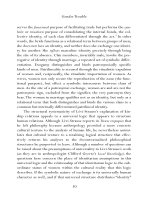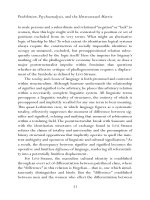GENDER TROUBLE 88
Bạn đang xem bản rút gọn của tài liệu. Xem và tải ngay bản đầy đủ của tài liệu tại đây (20.78 KB, 1 trang )
Prohibition, Psychoanalysis, and the Heterosexual Matrix
The relation of reciprocity established between men, however, is
the condition of a relation of radical nonreciprocity between men
and women and a relation, as it were, of nonrelation between women.
Lévi-Strauss’s notorious claim that “the emergence of symbolic thought
must have required that women, like words, should be things that were
exchanged,” suggests a necessity that Lévi-Strauss himself induces from
the presumed universal structures of culture from the retrospective
position of a transparent observer. But the “must have” appears as an
inference only to function as a performative; since the moment in
which the symbolic emerged could not be one that Lévi-Strauss witnessed, he conjectures a necessary history: The report thereby
becomes an injunction. His analysis prompted Irigaray to reflect on
what would happen if “the goods got together” and revealed the unanticipated agency of an alternative sexual economy. Her recent work,
Sexes et parentés,10 offers a critical exegesis of how this construction of
reciprocal exchange between men presupposes a nonreciprocity
between the sexes inarticulable within that economy, as well as the
unnameability of the female, the feminine, and lesbian sexuality.
If there is a sexual domain that is excluded from the Symbolic and
can potentially expose the Symbolic as hegemonic rather than totalizing in its reach, it must then be possible to locate this excluded domain
either within or outside that economy and to strategize its intervention in terms of that placement. The following rereading of the structuralist law and the narrative that accounts for the production of sexual
difference within its terms centers on the presumed fixity and universality of that law and, through a genealogical critique, seeks to expose
that law’s powers of inadvertent and self-defeating generativity. Does
“the Law” produce these positions unilaterally or invariably? Can it
produce configurations of sexuality that effectively contest the law
itself, or are those contests inevitably phantasmatic? Can the generativity of that law be specified as variable or even subversive?
The law forbidding incest is the locus of this economy of kinship
that forbids endogamy. Lévi-Strauss maintains that the centrality of the
53









